Global Pharma Summit 2019 Report
Transforming the Future of Pharma
On November 14th, 2019, Shimadzu (Asia Pacific) hosted The Global Pharma Summit in Singapore. This was seventh chapter of the event, with theme of “Transforming the Future of Pharma”. This technology forum reaffirmed Shimadzu’s commitment to contribute towards growth and development of Pharma business in Asia. The event brought 103 pharmaceutical industry leaders, health-care providers and researchers to Singapore from twenty countries around the world.
In his opening remarks, Shimadzu CEO Dr. Teruhisa Ueda very eloquently framed the event and set the expectations right, stating that “most things in the world today are powered by AI. This summit is also harnessing what Shimadzu calls “Analytical Intelligence”. This only-of-its-kind innovation in the world will be the backbone of all future labs [...] and you will experience this disruptive technology first-hand at this summit.”
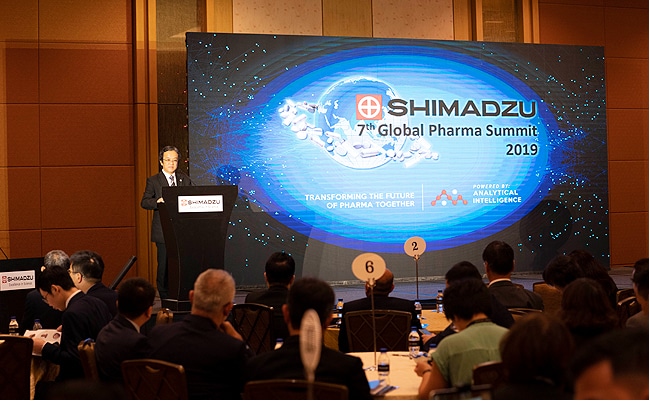
-
Global Trends in the Pharmaceutical Industry
-
Increasing Laboratory Efficiency: Powered by AI
-
The Potential of Emerging Therapeutics
-
Biopharmaceuticals
-
Medical Cannabis
-
Shimadzu’s Strategic Vision - Creating Shared Value for Human Health
-
Shimadzu Analytical Intelligence and Workflow Solutions for The Pharma Industry
-
Pioneering Partnership with Pharma Industry
-
Take Home Message- for Present and Future
Global Trends in the Pharmaceutical Industry
In recent years, the pharmaceutical industry has started integrating a new intelligence, which has given rise to new demands in both the research process and the laboratory itself. Adopting AI (artificial intelligence) to improve efficiency for various tasks, integrating a multitude of systems, improving productivity and reducing human error through automation - all of these trends have created a climate in which reliable, more efficient analysis in research and development is expected.
Increasing Laboratory Efficiency: Powered by AI
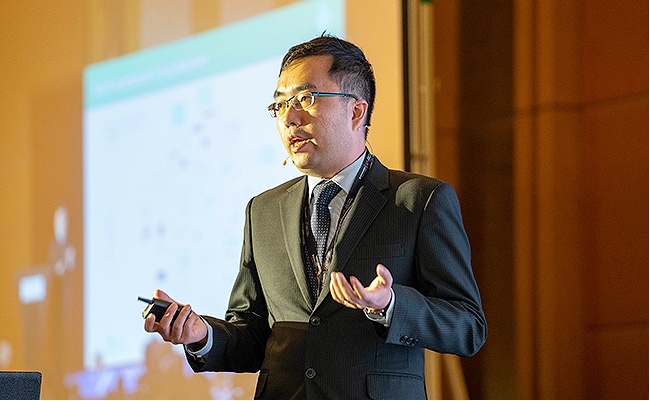
Dr. Jimmy Yen-Chu Lin
Similar to other industries, pharmaceutical industry has experienced improvements in its processes, specifically by improving efficiency and decreasing research time due to AI. At the conference, Dr. Jimmy Yen-Chu Lin from Insilico Medicine outlined the company’s AI platform for drug discovery. To hear Dr. Lin say it, “our goal in using AI is to decrease the research, discovery and preclinical test time from 3-4 years to a few months. By focusing on the precious time in the developmental stage as well as through diminishing costs, we can aim to get more drugs approved.” During his presentation he introduced real and practical application of AI to their research. Dr. Jimmy demonstrated utilization of AI for screening antibody drug candidates in cancer treatment or the search process for low molecular lead compounds, which has been called “finding a needle in a haystack”.
Furthermore, Indrajit Bose, the Vice President of major Indian pharmaceutical company Lupin Ltd., talked about the various challenges surrounding the Paperless Lab. He pointed out issues, including the integration of machines and software, project management and realizing user friendliness, while underscoring the importance of the right mindset with regards to our changing laboratories. He urged participants to embrace these changes, stating that “the Paperless Lab is no longer a dream. In reality, it’s an inevitability.”
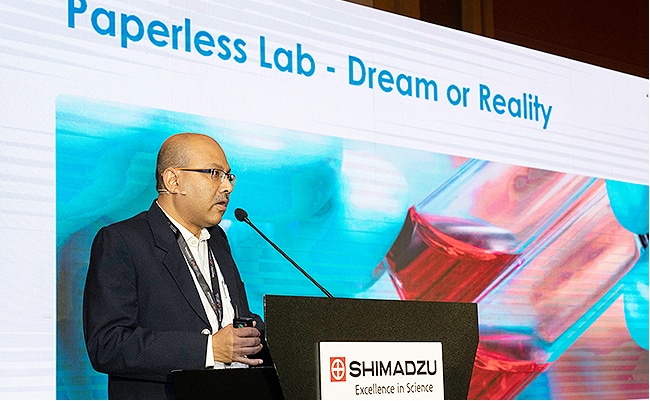
Mr. Indrajit Bose
Meanwhile, Luciano Rosado of Prati Donaduzzi, Brazil, discussed improving efficiency in laboratories through a multitude of data and introducing cases that show real improvement. Mr. Rosado outlined that “Prati is the largest producer of generic drugs in Brazil, and we have achieved this growth through our academic expertise and efficiency, as well as our polished technological process which places a high priority on cost-benefit analyses.” The company’s QC lab features Shimadzu’s Prominence HPLC system.
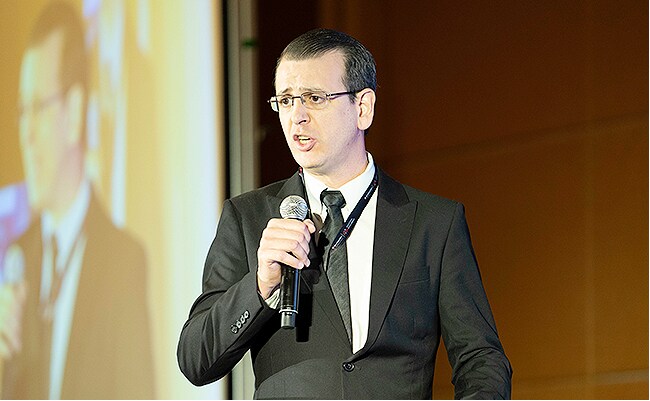
Mr. Luciano Rosado
The Potential of Emerging Therapeutics
Though Biopharma has been the largest growth segment for pharma business globally, another key emerging trend is medicinal use of cannabis. Use of cannabis as a drug product is supported by legalization process in multiple geographies of north America, Europe, Thailand etc. Several speakers operating at the edge of both these exciting industries took the stage at the summit.
Biopharmaceuticals
Biopharmaceutical products are much more complicated in their functionality and production process. The inherent complexity and complexity of process translates into expensive drug which typical are only solution for people dealing with fatal health concerns like cancer.
China’s Dr. Cuihua Chloe Liu outlined the potential of this market: “By 2020, the biopharmaceutical market will have grown to $1,400 billion, seeing an annual increase of 15 percent. This figure is double the traditional pharmaceutical market. In China, biopharmaceuticals have been seeing tremendous growth, and they carry tremendous potential in combatting rare diseases.”
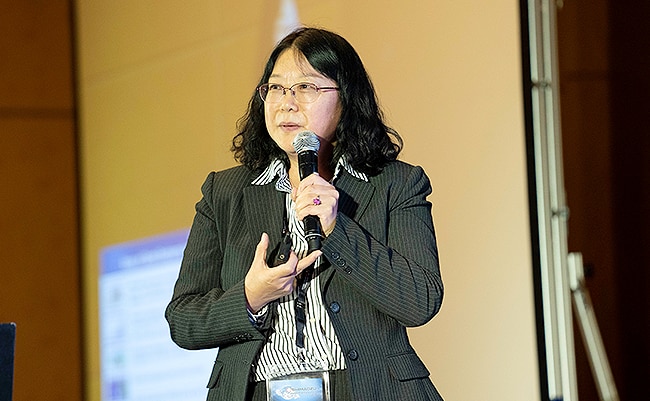
Dr. Cuihua Chloe Liu
Medical Cannabis
Anticipating the spread of medical marijuana in Thailand, Chao Phya Abhaibhubejhr Hospital is looking at developing the cultivation, manufacturing and quality control of cannabis, in addition to patient monitoring and establishing an educational system with regards to the drug. Though research is still being performed regarding the safety and efficacy of cannabis for medical use, and while it remains to be approved by the country’s regulatory institution, one of the hospital’s researchers, Dr. Pekakrong Kwankhao, described the situation in Thailand: “In February of 2019, usage of medical marijuana was legalized, and currently we are at the stage where only hospitals and accredited agencies may treat with the drug. In our hospital, we are exploring cannabis’ effect on quality of life among cancer patients and developing medical products to that end.”
The CEO of Front Range Biosciences Inc. USA, Dr. Jonathan Vaught, introduced the chemical diversity and potential of the medical effects of cannabis through outlining two examples of recent research, one concerning the effects of THC on cancer cell biology and another on applied research together with autistics. He stated that “cannabis has wide applications, both for medical as well as commercial use as wellness products. The secret to unlocking its potential lies in understanding its make-up and chemical diversity.”

Dr. Jonathan Vaught
Shimadzu’s Strategic Vision - Creating Shared Value for Human Health
Under its motto “Excellence in Science”, Shimadzu continuously strives to contribute to advancements in science through its analytical technology. In recent years, industries have undergone technology transformation. As the use of AI and IoT technologies are rapidly advancing in society, there is an increasing demand for creating new value by making people, machines and data connected. Shimadzu aims to create Shared Value for both human health and Shimadzu businesses by implementing AI technologies and developing products and solutions in partnership with the pharmaceutical industry.
Shimadzu Analytical Intelligence and Workflow Solutions for The Pharma Industry
By listening to the needs of researchers and other users of our products, Shimadzu has proposed its new concept of “Analytical Intelligence” to usher in a new intelligence for analytical instruments.
Analytical Intelligence describes automated support functions utilizing digital technology, such as M2M, IoT, and Artificial Intelligence (AI), that enable higher productivity and maximum reliability. It consists of systems and software that simulate expert operators automatically, determining whether conditions and results are good or not, providing feedback to users, and solving common problems. It increases data reliability by compensating for any differences between users in their instrument knowledge or experience.

Shimadzu has already integrated artificial intelligence as Analytical Intelligence for a number of instruments. These include the new Nexera UHPLC series which was released in March 2019. At this summit, Shimadzu exhibited not only the Nexera UHPLC series with Analytical Intelligence functionality but also a variety of analytical tools and instruments across the entire workflow of pharmaceutical and biopharmaceutical analysis from drug discovery through clinical trials and into production and quality assurance. These include MALDI-TOF platforms for routine measurements of intact protein mass and major glycoforms, GC-MS/MS for quantitative analysis of NDMA and NDEA in valsartan bulk drugs, and the LabSolutions CS network-compatible analysis data system that can meet the needs for technical compliance with regulatory requirements for data integrity like FDA 21 CFR Part 11.
Mr. Ahmad Eezani Abdullah Zawawi of Hoe Pharmaceuticals Malaysia, user of Shimadzu HPLCs, outlined “Shimadzu really understands their users and keeps providing new things for us. That helps us improve the reliability of testing and get results even faster.”
Pioneering Partnership with Pharma Industry
Shimadzu will continue to provide solutions to meet the pressing problems in the pharmaceutical industry together with its partners. Through its paradigm of Analytical Intelligence, Shimadzu continues to stand at the apex of technology. Following its release of the new UHPLC Nexera series, Shimadzu announced in October 2019 the launch of the Nexera UC Prep, a next-generation preparative supercritical fluid chromatography (SFC) system that provides the pharmaceutical industry with reliable high-performance semi-prep purification.
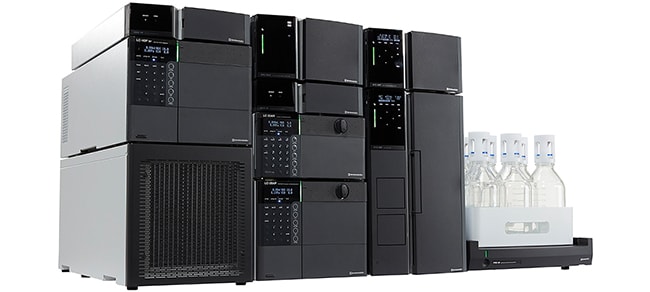
Nexera UC Prep
The Nexera UC Prep is part of Shimadzu’s Nexera UC SFC platform, which accommodates a wide variety of analyses and purifications. The platform is based around the Nexera ultra high-performance liquid chromatograph. Each Nexera UC Prep is configurable to user specifications in order to optimally perform the desired purification function, including chiral or achiral purifications, single injections, stacked injections, and fraction collections from several microliters to liters.
The reasons for integrating SFC are multitude: it reduces the need for costly and hazardous solvents used in normal phase prep LC, while shortening purification run time and drying time. Innovative technologies include a flexible format combination injector/fraction collector, CO2 pump with integrated chiller that requires less lab space and allows for benchtop use, a novel gas-liquid separator design, “LotusStream”, to ensure high recovery and low carryover, and easy-to-use preparative software, “Prep Solution”, to streamline operations.
Dr. Christopher Welch, who played a major part in the development of the Nexera UC Prep, discussed the background of the project, which became a reality due to the collaboration between Shimadzu and Enabling Technologies Consortium (ETC). “In 2017, ETC was looking for a partner to develop SFC technologies. Due to Shimadzu’s engineers’ demonstrated success in developing technology based on the needs of the consortium members, Shimadzu was chosen as ETC’s dedicated partner in this project. This is how this collaboration, and eventually this product, was birthed - through responding to real R&D needs.”
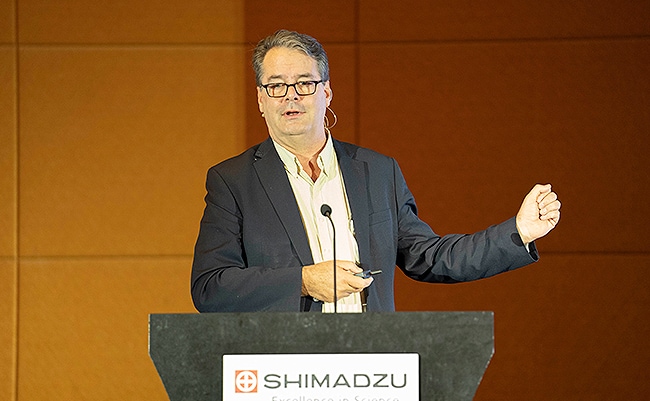
Dr. Christopher Welch
At the end of this year's summit, key panel discussed “Transforming The Future of Pharma”. Topics of discussion were wide, and perspectives on the theme were shared from viewpoints of manufacturing, CROs, clinical research as well as data science and technology of tools. Irrespective of the business or workflow, panel agreed that major trends of the pharmaceutical industry are improving efficiency, increasing productivity, and integrating systems all by digital transformation.
In addition, the development of drugs to treat incurable diseases, as well as developing human resources that have expertise in data analysis (made necessary by the stark increase in data overall), were also cited as important questions in the industry.
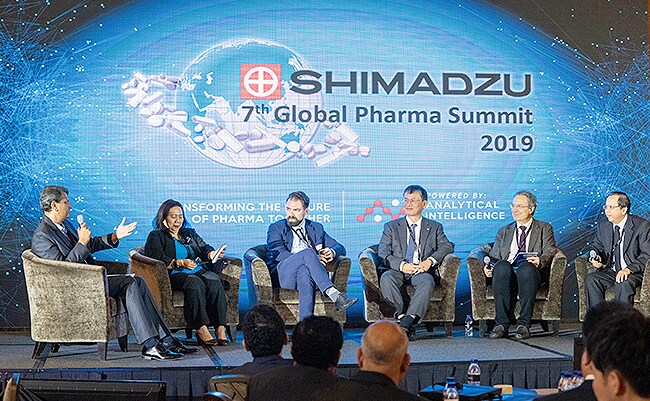
Take Home Message- for Present and Future
Shimadzu’s Shuzo Maruyama summed up the summit as follows: “This year’s summit was a chance to truly feel the various changes happening in the pharmaceutical industry stemming from new technology aiming to improve productivity and increase efficiency. As a provider of indispensable analytical technology, we aim to provide solutions, supporting researchers, reducing downtime in the lab and reducing human error through Analytical Intelligence. This is how we will provide new value for the industry as a whole.”
The pharmaceutical industry’s aim is to support our health. With regards to that, Shimadzu aims to not only continue to provide new products but is looking towards being a comprehensive healthcare solution provider for its global partners through its paradigm of Analytical Intelligence as AI technologies transform industries, including pharma. These activities are done with the grand goal of realizing a healthier, better lifestyle for everybody, and Shimadzu looks forward to addressing industry challenges on a global stage.




